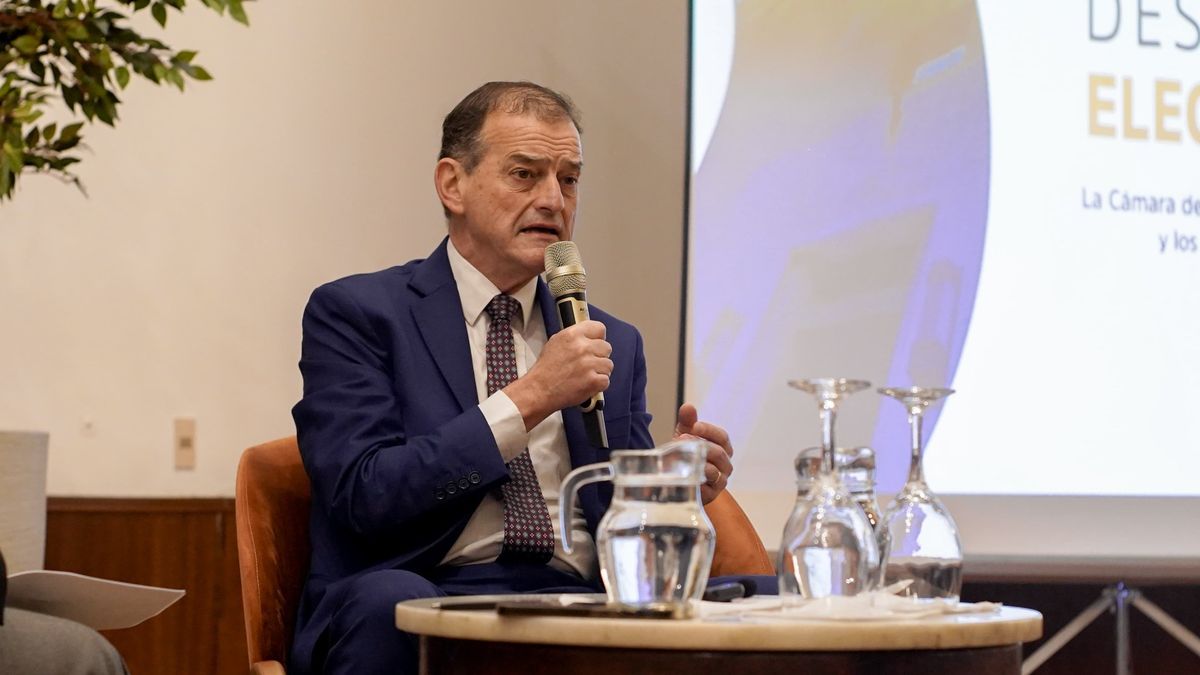Along the same lines he added that “it exists in the Uruguay what is called the tax expenditure, “That is to say, the State’s refusal to collect taxes for benefits that were granted at the time, which in Uruguay amounts to or is around 7% of GDP, which is practically double the average on the continent. Perhaps this tax expenditure should be reviewed, changes should be made, and there may be resources to be more fair in other types of taxes,” he explained.
“Without a doubt, the IRPF is a tax on those who work more. There are testimonies everywhere from people who do not find it useful to do extra work or who do not find another job useful because whatever they earn more is practically given to them by the State. We have to review it. We are going for the side of the discount, for the education of the children, for food. Certain items that can be deducted from the tax and in this way it will become a true income tax and not a tax on work as it is today.”
Guido Manini Rios, Open Town Hall.jfif
Oxygen for SMEs
“We understand that micro and small businesses, and medium-sized businesses as well, are the great generators of genuine work, which is what Uruguay needs for the creation of jobs. “Any oxygen we give it is not enough. Ultimately, if the company is maintained and continues to provide jobs, the State does not lose out,” he stressed.
What is exempted from being charged here, what is not charged for the application of what we propose, is not being spent on the social care that must be provided to the unemployed who later, due to not having opportunities, end up entering paths that are very expensive for society, such as drugs or crime. Therefore, the promotion of this micro, small and medium-sized business is an investment by the State, it is not a tax waiver,” he mentioned. Manini Rios as the axis of its main economic proposals.
He also referred to the situation of border businesses and the impact they are suffering due to the exchange rate difference with Argentina. The candidate reiterated his initiative in favor of tax exemption.
“The reasoning is that the State does not give up anything by exempting taxes because the neighbor on the border does not buy on this side, he buys on the other side. If there are taxes or no taxes, he buys on the other side. Now, if there are no taxes, the prices are closer,” he warned.
“Of course, given the disparity that existed with Argentina at one time, there was no tax exemption that was sufficient. But under normal conditions, that tax exemption can make the prices on the Uruguay side not so far from the Argentine side or the Brazilian side, and people do not go en masse to buy on the other side. What does the country gain? Uruguayan state? “The trade on this side creates jobs and changes the economic and social reality of the border area. So, we proposed, it was the first project that there was, tax exemption to bring prices closer,” he explained.
Fair debt and the “other collection of signatures”
The leader of Open Town Hall He did not avoid referring to his campaign to collect signatures against usury, which was called “fair debt” and which, despite some delays, reached the expected result to be submitted to a popular consultation along with the next ones. municipal elections of the month of May.
“I believe that the measures that were taken a few weeks ago at the level of Central Bank, According to some financial houses, it is a good sign on the right path. There is a public that is being reached, that is improving its situation, that is, on the side of the debt restructuring, those who owed less than 100,000 pesos, or through forgiveness, those who owed less than 5,000 pesos,” he said.
And he stressed: “In the right sense, what we say is totally insufficient. First of all, there are many lending companies that do not adhere to this agreement. Second, the main usurer In this country it is the Uruguayan State and it is not included, that is, the public creditor is not included in this agreement that was reached. In any case, we understand that it is going in the right direction and we are also satisfied that it is recognized through these measures that there really was a very serious problem.”
Also and in the same concept, he aligned himself with the rejection of plebiscite proposed by the PIT-CNT on the reform of social security and its eventual repeal. “It would undoubtedly be quite serious for the national economy. On the one hand, that which is the Uruguay guarantor of the commitment made,” he said.
In this regard he said: “We understand that the regime of the AFAP, “with all its defects, it has marked the beginning of a path, a mixed system that is alleviating the burden that the State bears in providing social security over time. It is not yet fully mature, there are still no AFAP contributors with more than 30 years of contributions because the system does not have it and, therefore, it has not yet matured as much as it needs to mature.”
“But we understand that this regime, ultimately, is better than the pure pay-as-you-go regime. If we go back to a pure pay-as-you-go system, it will be a step backwards and we will have governments conditioned going forward, we will have them conditioned by the payment service of that social security that will be increasingly more expensive,” he insisted.
The presidential candidate added: “We, on the other hand, the issue of the retirement age, We think that it is logical to go to 65 years, in the world we live in it makes no sense to stay with numbers from another era. We believe that the proposal of the plebiscite is quite irresponsible, that it is not thinking about the day after. We are very clear that this plebiscite is not good for the future of the country, that it will be one more anchor that Uruguay will have, that it will cause its greatest delay in the future.”
International integration and reduction of working hours.
Finally, the presidential candidate for Cabildo Abierto also expressed a negative opinion on the proposal of the reduction of working hours, stating that “it is an increase in price that many entrepreneurs may not be able to pay.”
“It is another milestone on the road to unemployment, towards the lack of job opportunities. And I don’t think anyone can guarantee that in six hours they will perform as well as ever. So I understand it as generating an increase in the cost of the system for those who provide work in Uruguay, and the big problem that Uruguay has is the lack of work. So we will end up worsening the problem,” he analyzed.
In this regard, he said: “I understand that as long as there is no guarantee that the same amount of work will be done in six hours as in eight, I do not see how this guarantee can be given. I do not see it as a positive factor, especially if we aim at the great priority of job creation.”
About the international insertion of the country and the role that the country has within the current integration block Mercosur, The retired general said that “we must try to change the rules or change attitudes so that this neighbourhood, this Mercosur, is ultimately part of the solution and not the problem. I think that is the great challenge, it is a balance that is sometimes difficult.”
“Uruguay was able, being within Mercosur, to make a Free Trade Agreement with Mexico. Well, we will have to go down the road to be able to move forward with the Free Trade Agreement, so that, in the windows, the cracks that the block allows, we can make it. It makes no sense that we are paying to enter the market and our competitors are not paying because they have those prior agreements,” he concluded.
Agreement and alerts in Chamber of Commerce
The president of the Chamber of Commerce and host of the event, Julio Cesar Lestido, He expressed his agreement with many of the comments made by the Cabildo Abierto candidate, especially those related to the situation of small and medium-sized businesses.
Along these lines, he put on the table a detailed discussion of the proposal launched by the PIT-CNT regarding the reduction of the working day. “Do you think that today a small or medium-sized company is in a position to say, after everything we have had to live through, pandemic, problems of inflation Worldwide, freight problems, drought, “I can tell a company now, look, you’re going to keep working, your team is going to work less, but are you going to pay them for hours that they’re not going to work? No, it’s not sustainable,” Lestido said vehemently.
“We have to sit down and talk about it. We have always said that, we are not against it, we are dealing with the issue and studying it. Of course we are talking about it.” productivity, But we have to be clear. When we talk about productivity in a company, we are talking about incorporating technology, of training, but what we have to clearly separate is that when I import technology, I will be more productive. The question is: am I more productive because I imported technology or because the person or collaborator who is working with me is more productive? “, reflected the business spokesperson.
The president of the Chamber referred again to the popular consultation on the reform of social security, where the union is having a strong role in opposition to those who promote it. “It is an issue that we understand could have a before and after if the plebiscite is approved. If that happens with the reform, we would face a country that practically will not have the tools to be able to develop everything we are talking about. If we are talking about reducing the hours of the work day, if we are talking about greater productivity, international insertion and competitiveness, If the repeal of the reform to be voted on in October is approved, it will be very difficult to address all of these issues,” Lestido concluded.
Source: Ambito




